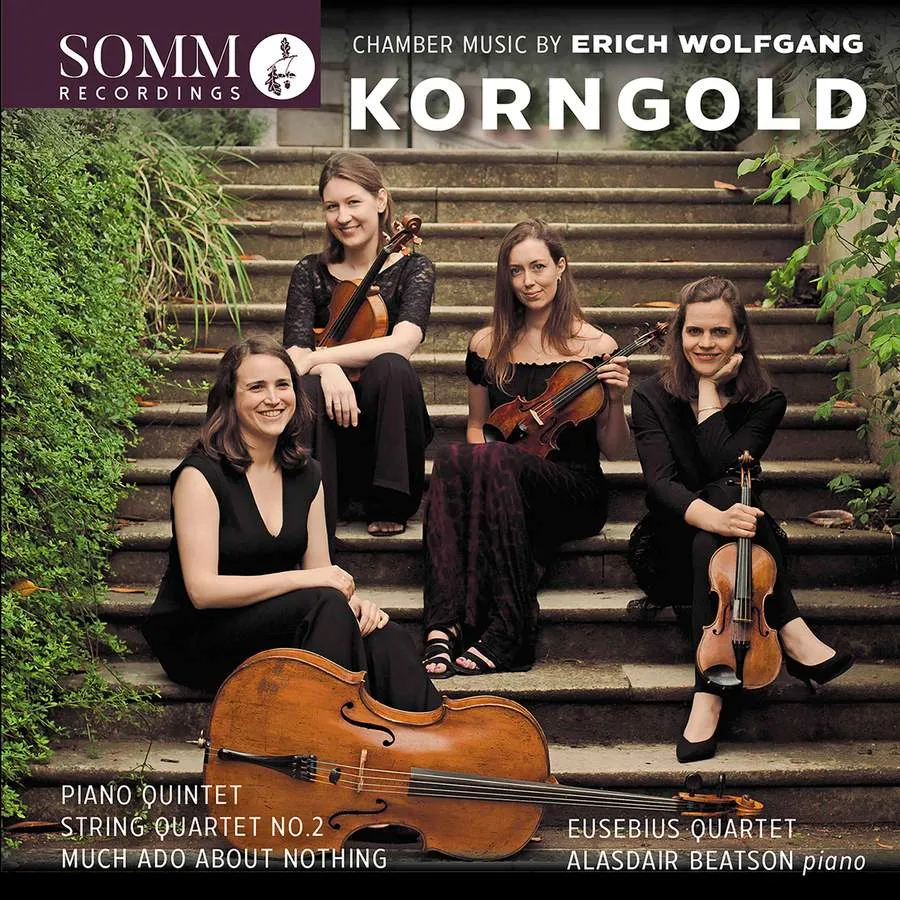
Korngold Piano Quintet in E major, Op. 15*; Viel Lärmen um Nichts (Much Ado About Nothing), Op. 11*; String Quartet No. 2 in E flat major, Op. 26 *Alasdair Beatson (piano), Eusebius Quartet SOMM Recordings SOMMCD 0642 68:30 mins
The Eusebius Quartet was formed in 2016 by four young British and American musicians and named after the poetic soul of Robert Schumann’s two alter-egos. Complemented by the pianist Alasdair Beatson, they have devoted their debut recording to some of Erich Wolfgang Korngold’s most personal and passionate chamber works. It has taken decades for the composer who was praised in his day as the greatest child prodigy composer since Mendelssohn to escape the bizarre stigmas that the mid 20th century attached to him for malodorous reasons all of their own.
These pieces all date from beyond Korngold’s child prodigy years, but before the Nazi threat sent him into exile in Hollywood, where Warner Brothers effectively saved his life. The Piano Quintet is from 1921, just after his opera Die tote Stadt. This is the work of a ridiculously gifted 24-year-old composer head over heels in love – as shown particularly in the slow movement. It’s a set of variations on Korngold’s song ‘Mond, so geh’st du wieder auf’, one of his Abschiedlieder (Songs of Farewell) – so-called because his family and that of the young actress he loved, Luzi von Sonnenthal, were endeavouring to part them. The pair were devastated, not yet knowing that they would marry three years later. One distinctive motif, with a downward-plunging seventh, became Korngold’s ‘Luzi’ theme.
The Eusebius Quartet and Beatson bring this heady score all the intensity it deserves, their lavish tone conjuring quasi-orchestral colours, sensitive to every twist of the rubato-laden canvas (and there are many). It’s extreme music, its heart unfashionably yet gloriously on its sleeve, and the ensemble performs with real sincerity, wisely adding no affectation. The musicians seem to feel the music just as it is, complex on the surface, but direct and straight from the heart. A warm, glowing clarity about the recorded sound is appropriate enhancement.
The suite of four movements from Korngold’s incidental music from Much Ado About Nothing exists in several different scorings, from full orchestra down to violin and piano, in which guise it has chiefly maintained popularity. But in 2012 an unknown string quartet version of three movements in Korngold’s writing turned up in an auction. This is its first recording, with assistance from Tom Poster, who made the arrangement of the missing Intermezzo. Again, the Eusebius Quartet takes the music on its own terms, performing it with affection and high spirits in droves.
Finally, the String Quartet No. 2 is the most ‘Viennese’ of Korngold’s three quartets: waltz rhythms, ladled-on portamentos and a glowing, chocolatey embarrassment of riches abounds in its atmospheric pages. Sometimes it’s hard, listening to the Eusebius here, to believe that there are only four musicians playing. Not for them the alternately wispy and over-pressed exaggerations that have become trendy of late. Instead, from their full-blooded yet flexible tone to their intelligent handling of the ebb and flow, they offer a joyous feast of Korngold at his finest.
Jessica Duchen